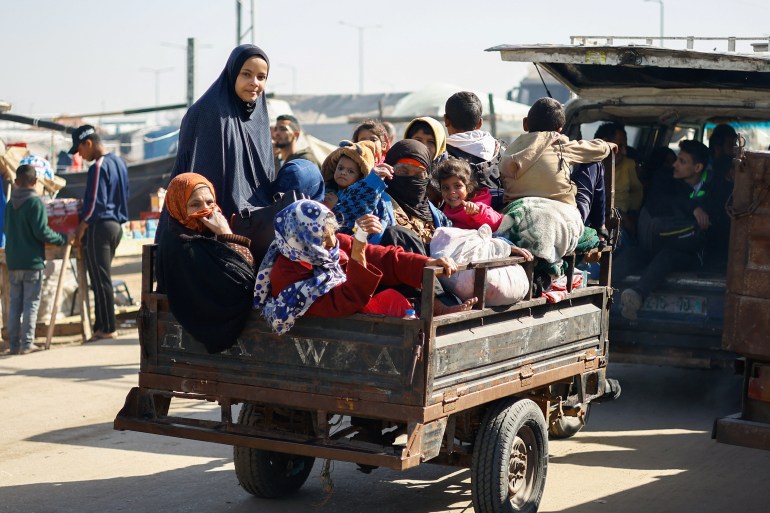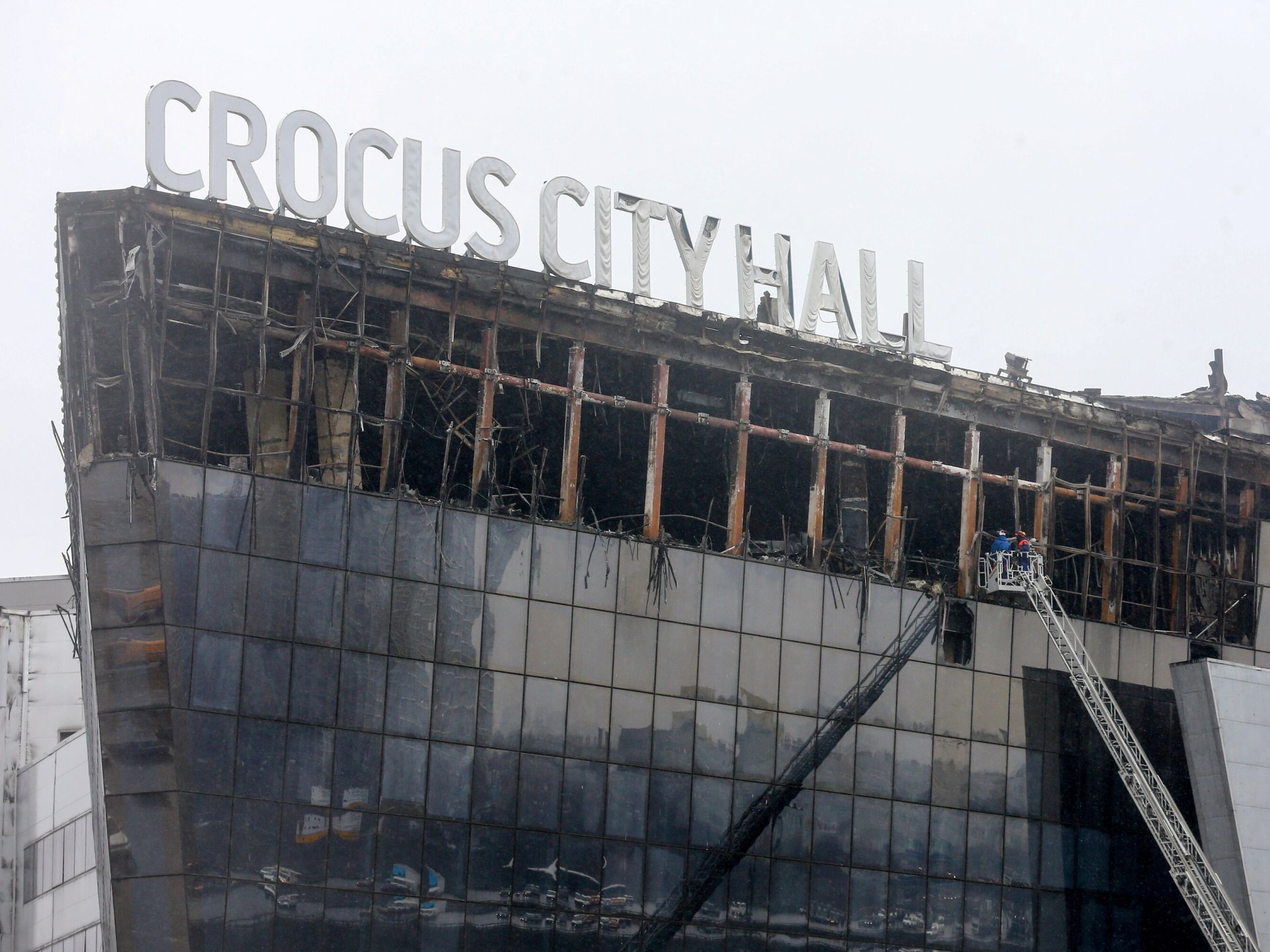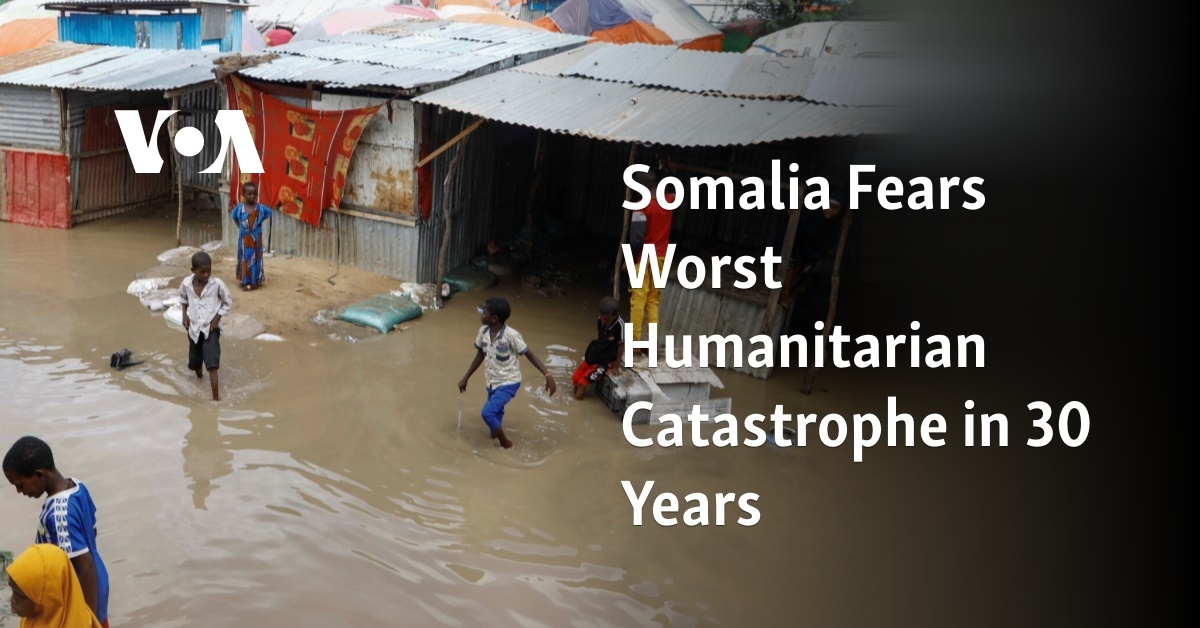
Montreal Canada – Abdallah Alhamadni knows that the clock is ticking.
The 51-year-old Palestinian father of three checks every day whether his efforts to bring his relatives to safety in Gaza are making progress.
But Alhamadni, a Canadian permanent resident who lives in Milton, Ontario, says he is stuck in a dangerous waiting game as Israel continues to wage war in Gaza.
“We feel paralyzed, depressed, frustrated and crying,” he told Al Jazeera. “Sometimes we feel like we have to be strong to support them because we are the only hope for them. A lot of things come together and we are alone.”
Originally from the Jabalia refugee camp In the northern Gaza Strip, Alhamadni is trying to bring 61 relatives, including 27 children, to Canada through a new temporary visa program for Palestinians affected by the Israeli military offensive.
Revealed last month, the scheme allows Canadian citizens and permanent residents to apply to bring extended family members from Gaza into the country, where they will be granted a temporary resident visa for up to three years.
But the process sparked criticism from applicants and human rights activists.
Alhamadni called it confusing and time-consuming. Gaza remains under heavy Israeli fire and faces regular power and internet outages, leaving Alhamadni struggling to reach his relatives and get the information he needs to fill out applications.
The amount of personal information that Palestinians must provide is also under scrutiny. Canadian immigration lawyers say the process goes beyond what is normally required.
A form (PDF) asks people to provide a detailed employment history dating back to age 16, as well as links to social media accounts and a list of all their in-laws. Applicants are also asked to identify any scars or injuries that required medical attention and how they sustained them.
“They bet everything [these] Impossible conditions are hanging over our heads,” said Alhamadni, who told Al Jazeera that his relatives have been displaced several times since the war in Gaza began. “I’m trying [to do] whatever I can.”
The program
Marc Miller, Canada’s Minister of Immigration, Refugees and Citizenship, announced the opening of the temporary resident visa program on January 9, three months after the start of the war in Gaza.
The move came amid public calls for the Canadian government to do more to help residents of the besieged enclave. At least 25,900 Palestinians have been killed in the Israeli bombing of the Gaza Strip since the war began on October 7th.
Senior United Nations officials have repeatedly called for a ceasefire as the area suffers from mass displacement of its residents, a crippled health system and a shortage of water, food and other humanitarian supplies.
“The situation on the ground in Gaza is challenging and unstable,” Miller said in one opinion Canadian Visa Program Announcement. “These new measures provide a humanitarian path to safety and recognize the importance of keeping families together in the face of the ongoing crisis.”
But Ottawa faced immediate criticism when it announced it would only issue up to 1,000 temporary visas for Palestinians from Gaza – a cap that human rights activists said was too low. Müller said later There was no strict limit on the number of applications accepted.
In an email to Al Jazeera, a spokesperson for Immigration, Refugees and Citizenship Canada (IRCC) said the program “will expire once 1,000 applications have been accepted for processing or one year after public policy takes effect, whichever occurs first.” “.
“IRCC remains flexible in assessing the situation, including the volume of applications received and the possibility of facilitating eligible family members to leave Gaza and enter a safe third country,” the spokesman said.
As of Jan. 16, Canada was processing 144 applications, none of which had yet been finalized, the spokesperson added. The government also said there was no guarantee that applicants would be able to leave the Gaza Strip, which is under a tight Israeli siege.
As part of a long-standing blockade, Egypt has also restricted departures via the Rafah border crossing on the southern border of the Gaza Strip.
“If people manage to leave Gaza, the security assessment will be completed in the third district, where IRCC can collect biometric data,” the IRCC spokesman said. “IRCC will then finalize it [temporary resident visa] Submit an application and decide whether [the] The person is allowed to enter Canada.”
Bureaucratic “cruelty”
According to Naseem Mithoowani, an immigration lawyer in Toronto, the Canadian government has failed to provide adequate information and clear communication about the visa program, causing confusion in the Palestinian community.
“People are concerned about the cap and whether it will be extended. how applications are evaluated for their place in the queue; [and] Why some people progress further than others despite applying at the same time,” Mithoowani told Al Jazeera.
“The process itself is not transparent.”
She said Palestinian Canadians have also raised concerns about some of the program’s requirements, including the ability to provide financial assistance to their relatives from Gaza. They have also asked who will see the information provided in the applications and whether it will be shared with other countries.
“The Palestinian community has lost a lot of trust in our government and that, I think, is part of the increased fear or increased need for communication in this particular case,” Mithoowani said.
Yameena Ansari, an immigration and refugee lawyer in Calgary, also said that while the program initially represented a “glimmer of hope” for many Palestinians in Canada, their hopes were “quickly dashed” as they realized its limited scope and requirements .
“We have been informed that these very invasive questions are coming from Canada. They are not from Israel or Egypt,” she told Al Jazeera.
Security checks are a normal part of the immigration process, Ansari explained. But “the idea of throwing so many forms at people trying to escape a crisis” is unimaginable.
“Something that never escapes me… is the cruelty of the forms,” Ansari said. “We can be cruel to people in bureaucratic and administrative ways.”
She also pointed out that a seemingly small hurdle to applying could be insurmountable for someone struggling with violence and displacement.
Minister defends plan
When asked about the outrage over the visa application questions, the IRCC spokesperson told Al Jazeera that Canada was using a “multi-tiered vetting approach” to the Gaza visa program.
“This is part of standard practice in crisis response situations where IRCC is not present on site to initiate an initial review and collection of biometric data, as we did in Afghanistan,” the spokesperson said.
“The additional background information included in the form allows us to collect expanded biographical information to begin the security clearance process while the applicant is still in Gaza.”
Miller, Canada’s immigration minister, also cited security concerns to justify the questions. “These are the details we need. We don’t know who these people are; They’re not Canadian, they’re not permanent residents.” he told CBC last week.
“Anyone who has experience immigrating to Canada knows that there are a lot of intrusive questions and that, to be quite honest, coming to Canada is not a right. I think, on the other hand, we have a duty to do something about this humanitarian disaster,” Miller said.
“A lot of compassion for the people going through this – I can’t imagine the situation they’re in. But we need assurances about who we’re getting out, and those details, which I often admit, can be intrusive. ”
“Absurd, incomprehensible”
However, Julia Sande, a human rights and policy activist with Amnesty International Canada, drew a contrast between Canada’s response to Israel’s war in Gaza and its response to Russia’s invasion of Ukraine.
Just weeks after the start of the war in Ukraine in 2022, Ottawa started a special immigration route that allows Ukrainians and their immediate family members – including those without any connection to Canada – to seek safety in the country.
There was no upper limit on the number of applicants. Some fees and other procedures have been waived, and more than 210,000 Ukrainians have since come to Canada through the program, it says Government figures.
“The refugee Ukrainian program was, in my opinion, something unusual when you compare it to Canada’s historical programs, but it was wonderful,” Sande said. “It has shown that Canada is more than capable of opening its arms and welcoming people fleeing dangerous situations.”
But in the case of Gaza, Sande pointed out that the Canadian government has erected additional barriers for Palestinians “knowing that they are fleeing abhorrent suffering.”
“On what basis do we treat civilians in Gaza differently? What assumptions are made about them?” asked Sande. The trial, she said, raises concerns about racism and the possibility that “Gaza residents will be portrayed as a security threat.”

“The need to explain scars when you are a population subjected to relentless bombardment, to which Canada itself may be contributing Weapons exports to Israel – it’s absurd, it’s incomprehensible,” she said.
For Alhamadni, the wait is dragging on. His family’s visa applications are still in the early stages of the application process, and Alhamadni remains fearful that the visas may be issued late, if they are issued at all.
“My family is them [whole] World. “My family is everything to me,” he said. “I can’t wait a minute. Something will happen in a minute. A bomb will come.”
But despite the hurdles, Alhamadni – who is to collect money to finance his relatives’ visa applications and their trips to Canada – emphasized that he had not lost hope.
“I believe that one day we will have our freedom,” he told Al Jazeera. “One day the light will come. One day we will see a better future.”






Recent Comments